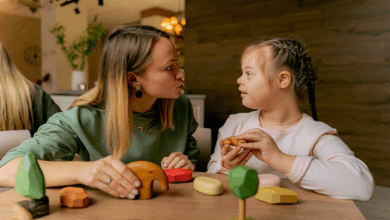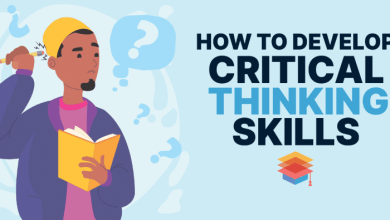
Early childhood education is key for building social-emotional skills like managing emotions, forming relationships, and showing empathy. These skills support academic success, well-being, and future relationships. Ages 3 to 5 are critical for this development, and quality early learning focuses on nurturing these abilities alongside academics.
Understanding Social-Emotional Learning (SEL)
Social-emotional learning encompasses the skills children need to understand and manage emotions, set goals, show empathy, and maintain positive relationships. The Collaborative for Academic, Social, and Emotional Learning identifies five core components that make up effective SEL:
Self-awareness involves recognizing one’s emotions, thoughts, and values, and understanding how they influence behavior. Young children begin developing this skill when they learn to identify feelings like happiness, frustration, or excitement.
Self-management refers to the ability to regulate emotions, thoughts, and behaviors effectively. This includes managing stress, controlling impulses, and setting personal goals. A child who takes deep breaths when angry instead of hitting demonstrates developing self-management skills.
Social awareness encompasses understanding others’ perspectives and empathizing with people from diverse backgrounds. Children show social awareness when they notice a classmate feeling sad and offer comfort.
Relationship skills include the ability to establish and maintain healthy relationships with diverse individuals and groups. This involves clear communication, active listening, cooperation, and help-seeking when needed.
Responsible decision-making involves making constructive choices about personal behavior and social interactions based on ethical standards and social norms. Children practice this when they choose to include a new student in their play group.
Key Social Skills Children Develop in Preschool Settings
Early learning environments provide rich opportunities for children to practice social skills in structured, supportive settings. These experiences lay the groundwork for future success in school and beyond.
Communication and Language Skills
Preschool settings naturally encourage verbal and non-verbal communication. Children learn to express their needs clearly, ask questions, and engage in back-and-forth conversations. They discover how to use their words instead of physical actions to resolve conflicts or get attention.
Through daily interactions, children also develop listening skills. They learn to pay attention when others speak, follow multi-step directions, and respond appropriately to questions. These foundational communication abilities serve them well throughout their educational journey.
Cooperation and Teamwork
Group activities and collaborative play teach children how to work together toward common goals. Whether building a block tower with friends or participating in a group art project, children learn to share resources, take turns, and compromise when opinions differ.
These experiences help children understand that different perspectives can coexist and that working together often produces better results than working alone. They begin to see themselves as part of a larger community rather than just individuals.
Emotional Regulation
Early learning environments provide safe spaces for children to experience and process a full range of emotions. Teachers and caregivers help children identify their feelings, understand what triggers certain emotions, and develop healthy coping strategies.
Children learn that all feelings are valid, but not all behaviors are acceptable. They practice techniques like deep breathing, counting to ten, or asking for help when emotions feel overwhelming. These skills become invaluable tools for managing stress and challenges throughout life.
Empathy and Perspective-Taking
Through diverse social interactions, children begin to understand that others have thoughts, feelings, and experiences different from their own. They learn to recognize emotional cues in facial expressions and body language, developing the ability to respond with kindness and understanding.
Role-playing activities and storytelling particularly support empathy development. When children act out different scenarios or discuss characters’ motivations in books, they practice seeing situations from multiple viewpoints.
Practical Tips for Parents to Promote Social Skills at Home
Parents play a crucial role in supporting their children’s social-emotional development. The skills children learn in settings like daycare in Taylorsville can be reinforced and extended through intentional home practices.
Model Positive Social Interactions
Children learn primarily through observation and imitation. When parents demonstrate respectful communication, active listening, and conflict resolution, children absorb these behaviors as normal ways of interacting with others.
Use everyday situations as teaching moments. When disagreements arise between family members, verbalize your problem-solving process. Say things like, “I’m feeling frustrated right now, so I’m going to take a few deep breaths before we continue this conversation.”
Create Opportunities for Social Practice
Arrange playdates, visit community spaces, and encourage participation in group activities that align with your child’s interests. These experiences provide natural opportunities to practice social skills in low-pressure environments.
Consider activities like library story time, playground visits, or neighborhood walks where children can interact with peers and adults in various contexts. Each interaction builds their social confidence and competence.
Teach Emotional Vocabulary
Help children develop the language needed to express their feelings accurately. Instead of simply asking if they’re “good” or “bad,” introduce more specific emotional words like frustrated, disappointed, excited, or proud.
Read books that explore different emotions and discuss the characters’ feelings. Ask questions like, “How do you think the character felt when that happened?” or “What would you do if you felt that way?”
Practice Problem-Solving Together
When conflicts arise, guide children through the problem-solving process rather than immediately providing solutions. Ask questions that help them think through the situation: “What happened? How did that make you feel? What are some ways we could solve this problem?”
This approach builds critical thinking skills while demonstrating that problems can be solved through calm discussion and creative thinking.
Establish Consistent Routines and Expectations
Clear, consistent expectations help children feel secure and understand social boundaries. Establish family rules about respectful communication, sharing, and treating others kindly.
When children know what to expect and what’s expected of them, they can focus their energy on learning and growing rather than figuring out constantly changing rules.
Conclusion
Social-emotional development is essential for long-term success, influencing education, mental health, and relationships. Teaching kids emotional regulation and relationship skills reduces anxiety and helps them handle stress, making it vital for parents and educators to prioritize alongside academics.




